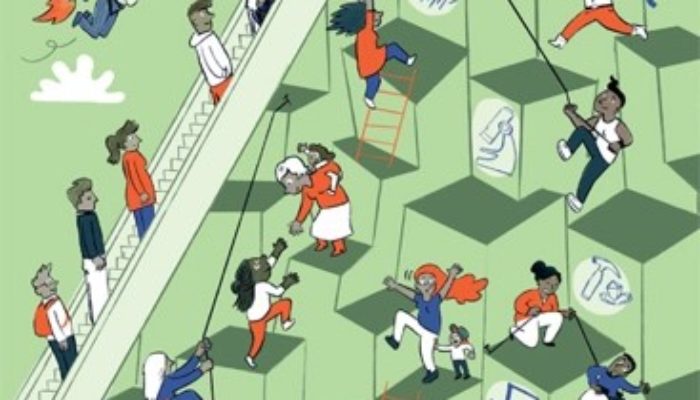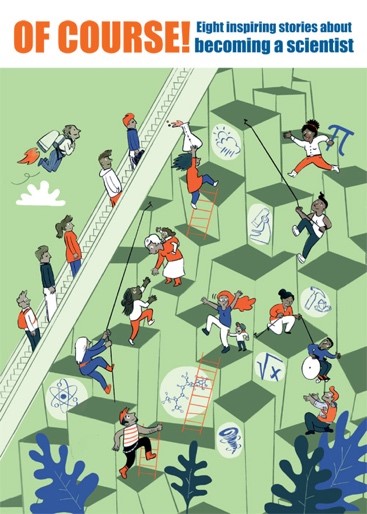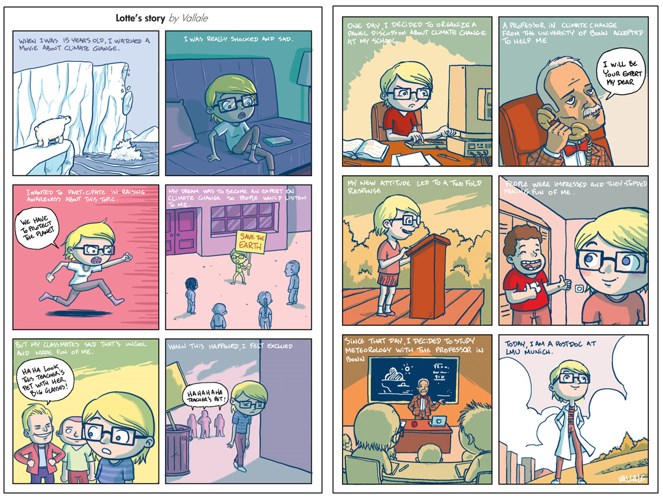
The number of women in science and academia drops with each career step in the fields of science, technology, engineering and mathematics (STEM fields). This systematic under-representation of women towards the top of the academic career path is called the “leaky pipeline”. In Germany about 50% of the students in mathematics and natural sciences are women, but there are only 20% of female professors. Therefore, the STEM fields lack the richness of diversified population. This has significant consequences on the research system. Diverse workplaces have been shown to be more productive, more innovative and more creative because people with different background address problems in different ways, ask different questions, and come up with different hypotheses and strategies to solve problems (e.g. Bear and Woolley, 2011).
The Collaborative Research Center “Waves to Weather” (W2W) was established in 2015 to address the great challenge of identifying the limits of weather predictability and producing the best physically possible forecasts. The leaky pipeline is also an issue in this group that is made up of about 80 scientists in the fields of meteorology, mathematics and computational sciences. About 30% of the current PhD students in W2W are women, but only 18% of the project leaders are women. This under-representation of women among project leaders has an impact on early career scientists, some of them feel insecure about their future in academia, especially considering the challenges related to work-life balance. Lack of self-confidence is also observed in schoolgirls during workshops offered to introduce them to meteorology and W2W research questions. One activity regularly offered is the “forecast factory” (Charlton-Perez and Dacre, 2011) in which the participants solve a simple advection equation for temperature to predict weather. Although this is a fun team effort, the first reaction of some of the schoolgirls can be very insecure.
One way to increase the self-confidence of girls and women and therefore to close the “leaky pipeline” is to provide role models to the students and scientific community. Gender diversity in our fields is not only a woman’s issue but also an issue of academia as a whole. For instance, group leaders can actively build a mixed group to ensure more fruitful discussions, and a friendlier, more respectful and more productive environment.
To this end, I designed and coordinated a comic book called “Of course!”. The aim was to interview female and male role models in W2W and to illustrate the interviews to make them appealing to all age groups, from school children to professors. However, W2W is rather a small group and it quickly became clear that the project would be more relevant if other research programs would join the adventure. The coordinators of the Collaborative Research Center “Scaling Cascades in Complex Systems” and the Research Group “MS-GWaves” accepted to join and proposed researchers in their group to also be interviewed.
In total, eight researchers were identified in these three research programs. They are PhD students and professors in Meteorology, Mathematics and Physics in Germany and in Switzerland who have all experienced gender biases and imbalance at home while growing up, during their education, and at their work place, e.g. at their research institute. What makes their story inspiring is that they have actively made positive changes to lead a fulfilled life as a scientist.
I personally interviewed the eight researchers in person whenever possible, and through phone calls otherwise. I then wrote down their personal stories, highlighting the inspiring aspects and structuring them to make them easier to illustrate (e.g., emphasizing visual anecdotes). The anonymity of the scientists was maintained in some cases. The interviews were reviewed by the scientists, and modified for their approval. A common element in all the stories is a “switch”, i.e. a situation that triggered a need, or at least a strong wish for positive change.
The initial concept was to recruit an artist who had already worked with me to illustrate the eight interviews. But it was obvious that the project would benefit from a diversity of graphic styles. The artist illustrated one story and recommended seven colleagues who all accepted to be part of the project. The result is a colorful and diverse comic book, which mirrors the diversity of stories and personalities interviewed. This is a concrete example of the positive impact diversity can have on a project involving many collaborators!
The comic book is available on the website of W2W, in English and in German:
https://www.wavestoweather.de/equal_opportunity/activities/comic-book
“Of course!” has been distributed to the W2W community and to international colleagues. It will be distributed at workshops offered to schoolgirls, e.g. “Girls’ Day”, in schools, in teacher training centers, in universities and at international conferences. The project has received very positive feedback so far. As an example, a colleague wrote: “We like the comic book a lot! Each story resonates with many of the experiences of women in academia, and demonstrate a multitude of issues and obstacles encountered by female scientists, but always in a constructive way and with a positive & encouraging outlook. We are very impressed by the great variety of comic styles. We like the illustrations as well as the balanced touch of irony and humor, and are impressed by how the interviews were “translated” into the comics format. We think the comic book will be appealing to the younger generation which it aims at. The project was a grand idea and has been realized in a brilliant way!”. In addition, one of the researchers featured in “Of course!” was interviewed about her participation in the Italian newspaper “Il Piccolo”. I was invited to present the project at an Equal Opportunity Lunch Seminar at the University of Bergen. About 25 scientists took part in this event, sharing their personal experience and discussing cultural differences in addressing gender imbalance, positive discrimination, etc. “Of course!” was also recently featured in the magazine of the Ludwig-Maximilians-Universität where W2W is based.
This project continues to flourish and I am looking for new role models, women and men, who are international researchers in STEM fields to interview. If you would like to participate or to comment on this project, please contact me (audine.laurian@lmu.de).
Further activities and measures to promote equal opportunity in W2W are detailed here: http://www.wavestoweather.de/equal_opportunity
W2W is funded by the German Research Foundation (DFG) for up to 12 years. The institutes participating in W2W are the Ludwig-Maximilians University in Munich, the Johannes Gutenberg University (Mainz), the Karlsruhe Institute of Technology, the Technische Universität München (Munich), the Ruprecht-Karls University (Heidelberg), the Deutsches Zentrum für Luft- und Raumfahrt (DLR, Oberpfaffenhofen in the Munich area), and the Universität Hamburg. To find out more about W2W visit: http://www.wavestoweather.de.
Edited by Mengze Li, Athanasios Nenes and Fei Luo.
References
Bear J. B., and Woolley A. W., 2011: The role of gender in team collaboration and performance, Interdisciplinary Science Reviews, 36, 146-153, https://doi.org/10.1179/030801811X13013181961473
Charlton‐Perez, A., and H. Dacre, 2011: Lewis Fry Richardson’s forecast factory – for real, Weather, 66, 52-54, https://doi.org/10.1002/wea.670




BKL
Well done for the good job. The need for gender diversity and inclusion at the workplace cannot be overemphasized.